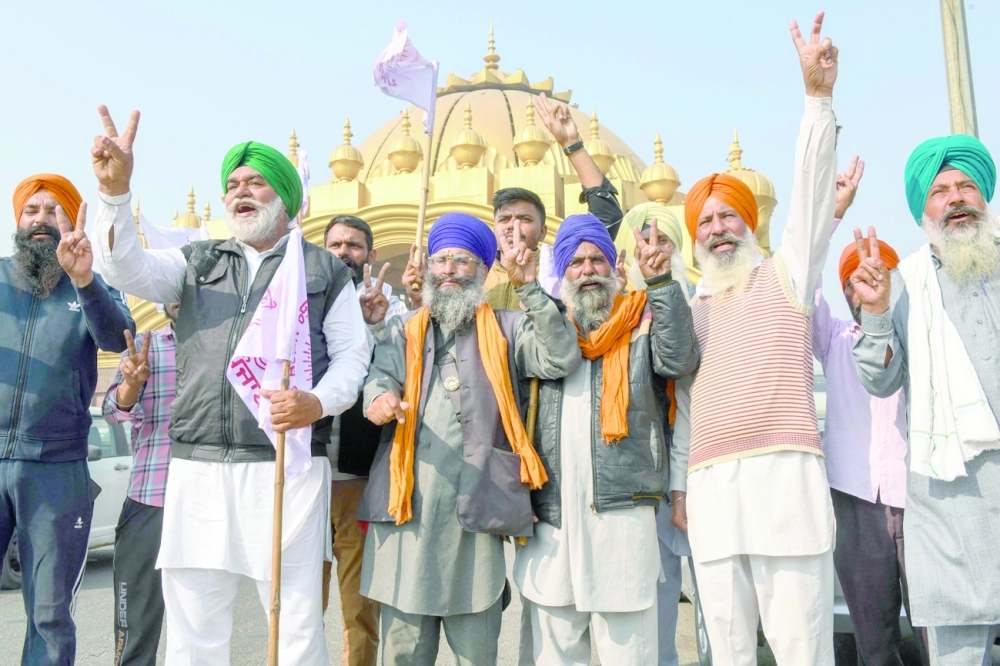

GHAZIABAD, India: In a surprise announcement on Friday, Prime Minister Narendra Modi said he would repeal agriculture laws that farmers have been protesting against for more than a year, sparking celebrations for what farmers called a hard-fought victory.
Modi's decision is a significant climb-down for the combative leader and comes as state elections in politically important grain-belt states loom.
The legislation - three laws introduced in September last year - was aimed at deregulating the sector, allowing farmers to sell produce to buyers beyond government-regulated wholesale markets where growers are assured of a minimum price.
Farmers, fearing the reform would cut the prices they get for their crops, staged nationwide protests that drew in activists and celebrities from India and beyond, including climate activist Greta Thunberg and pop singer Rihanna.
"Today I have come to tell you, the whole country, that we have decided to withdraw all three agricultural laws," Modi said in an address to the nation.
"I urge farmers to return to their homes, their farms and their families, and I also request them to start afresh."
The government would repeal the laws in the new session of parliament, starting this month, he said.
The concession on laws the government had said were essential to tackle chronic wastage and inefficiencies comes ahead of elections early next year in Uttar Pradesh (UP), India's most populous state and long a key political battleground, and two other northern states with large rural populations.
Modi's capitulation leaves unresolved a complex system of farm subsidies and price supports that critics say the government cannot afford.
It could also raise questions for investors about how economic reforms risk being undermined by political pressures.
Protesting farmers, who have been camped out in their thousands by main roads around the capital, New Delhi, celebrated Modi's back-track.
"Despite a lot of difficulties, we have been here for nearly a year and today our sacrifice finally paid off," said Ranjit Kumar, a 36-year-old farmer at Ghazipur, a major protest site in Uttar Pradesh.
Jubilant farmers handed out sweets in celebration and chanted "hail the farmer" and "long live farmers' movement".
Rakesh Tikait, a farmers' group leader, said the protests would only be called off when parliament repealed the laws.
VULNERABLE TO BIG BUSINESS
Modi's Bharatiya Janata Party (BJP) government said last year there was no question of repealing the laws. It attempted to break the impasse by offering to water down the legislation but protracted negotiations failed.
The protests took a violent turn on January 26, India's Republic Day, when farmers overwhelmed police and stormed the historic Red Fort in New Delhi after tearing down barricades and driving tractors through roadblocks.
One protester was killed and scores of farmers and policemen were injured.
Farmers say the changes would make them vulnerable to competition from big business and they could eventually lose price support for staples such as wheat and rice.
The government says reform of the sector, which accounts for about 15% of the $2.7 trillion economy, would have meant new opportunities and better prices for farmers.
Modi announced the scrapping of the laws in a speech marking the birth anniversary of Guru Nanak, the founder of Sikhism. Many of the protesting farmers are Sikh.
He acknowledged that the government had failed to win the argument.
The farmers are also calling for minimum support prices for all of their crops, not just rice and wheat, a new demand that has gained traction among farmers across the country.
Some agriculture experts said Modi's reversal was unfortunate because the reforms would have brought new technology and investment.
"It's a blow to India's agriculture," said Sandip Das, a New Delhi-based researcher and agricultural policy analyst.
"The laws would have helped attract a lot of investment in agricultural and food processing - two sectors that need a lot of money for modernisation."
The Confederation of Indian Industry (CII), a group that represents top corporations, had pinned hopes on the laws to pave the way for modernising India's decrepit post-harvest infrastructure. - Reuters
Oman Observer is now on the WhatsApp channel. Click here


